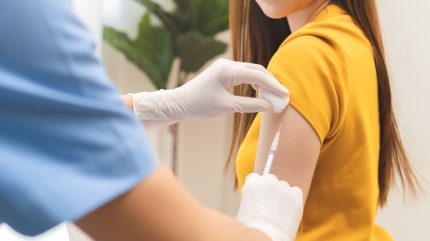

GSK has reported positive interim results from its Phase II trial of mRNA-based multivalent influenza vaccine candidate, GSK4382276A.
The trial, which included 500 participants across two age groups, aimed to evaluate the reactogenicity, safety, and immunogenicity of the vaccine.

Discover B2B Marketing That Performs
Combine business intelligence and editorial excellence to reach engaged professionals across 36 leading media platforms.
It involved 250 healthy younger adults aged 18 to 64 years and an equal number of healthy older adults aged 65 to 85 years.
The trial compared different dose levels of the vaccine candidate with an age-appropriate, licensed comparator vaccine.
The vaccine encodes antigens matched to all three World Health Organization (WHO)-recommended influenza strains.
According to the findings, it met pre-defined success criteria in both age groups.

US Tariffs are shifting - will you react or anticipate?
Don’t let policy changes catch you off guard. Stay proactive with real-time data and expert analysis.
By GlobalDataInterim data indicated that the vaccine candidates have an acceptable safety and reactogenicity profile for all mRNA formulations assessed.
This data suggested GSK4382276A’s potential for improved immune responses against influenza A and B strains compared to current vaccines.
GSK’s findings build upon earlier research from another Phase II trial and confirm that the mRNA platform can produce strong antibody responses while maintaining a favourable safety profile.
Following these results, the company plans to advance the GSK mRNA seasonal influenza vaccine programme into late-stage clinical development.
GSK previously entered into a licensing agreement with CureVac, which granted GSK full rights to develop and manufacture influenza and Covid-19 vaccine candidates.
GSK is also investing in advanced technologies, such as AI/ML-based sequence optimisation and nanoparticle design, to streamline its mRNA vaccine manufacturing processes.
GSK chief scientific officer Tony Wood said: “This marks a significant advancement in our mRNA programme, and these data support moving into late-stage development.
“Ultimately, our goal is to develop a new best-in-class vaccine to bring greater protection to people through the influenza season.”
The latest development comes after the company announced that Part II of the Phase I/II TH HSV REC-003 trial of its therapeutic herpes simplex virus (HSV) vaccine candidate, GSK3943104, did not meet its primary efficacy endpoint.
mRNA vaccine coverage on Pharmaceutical Technology (Or Clinical Trials Arena) is supported by Trilink. Editorial content is independently produced and follows the highest standards of journalistic integrity. Topic sponsors are not involved in the creation of editorial content.





